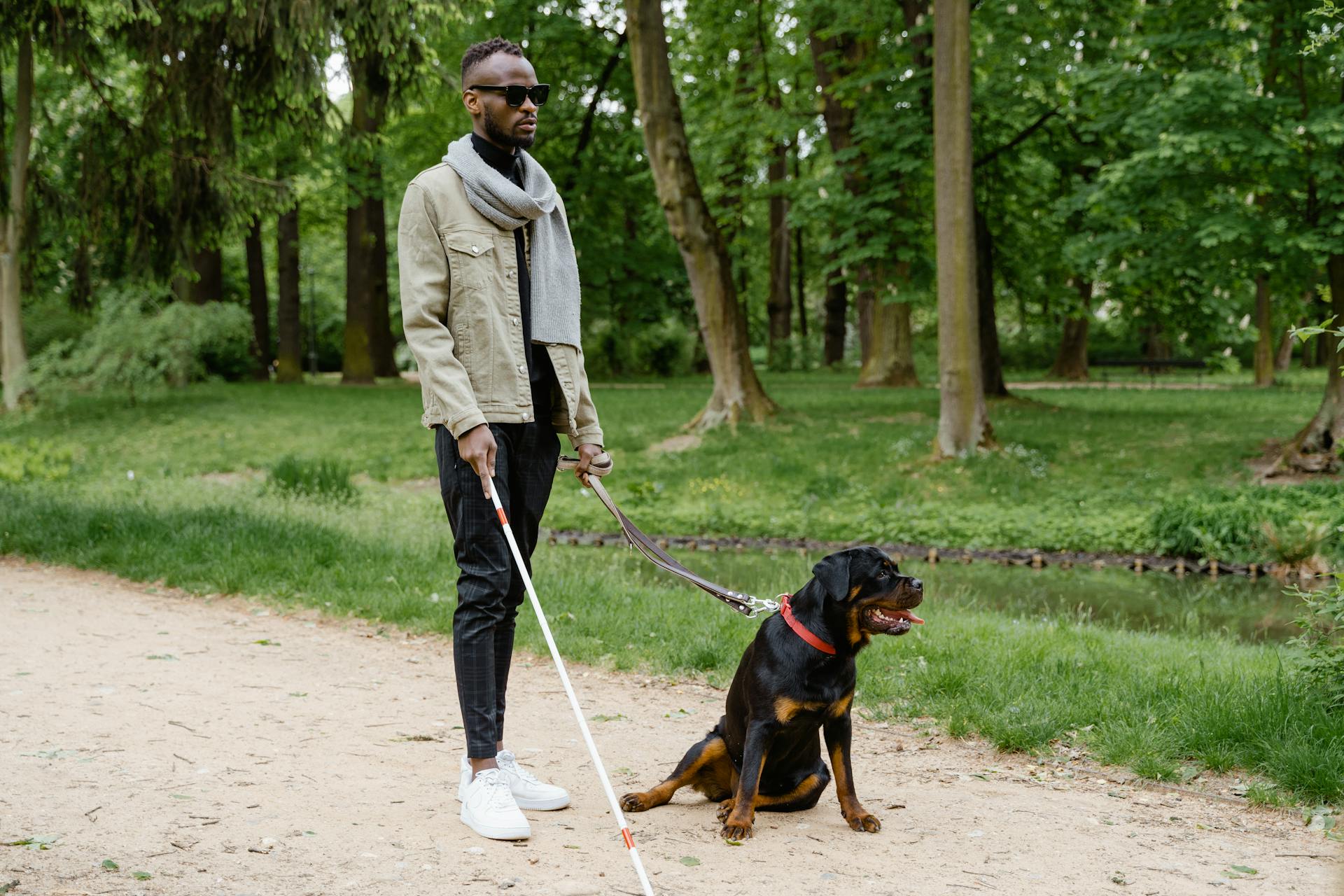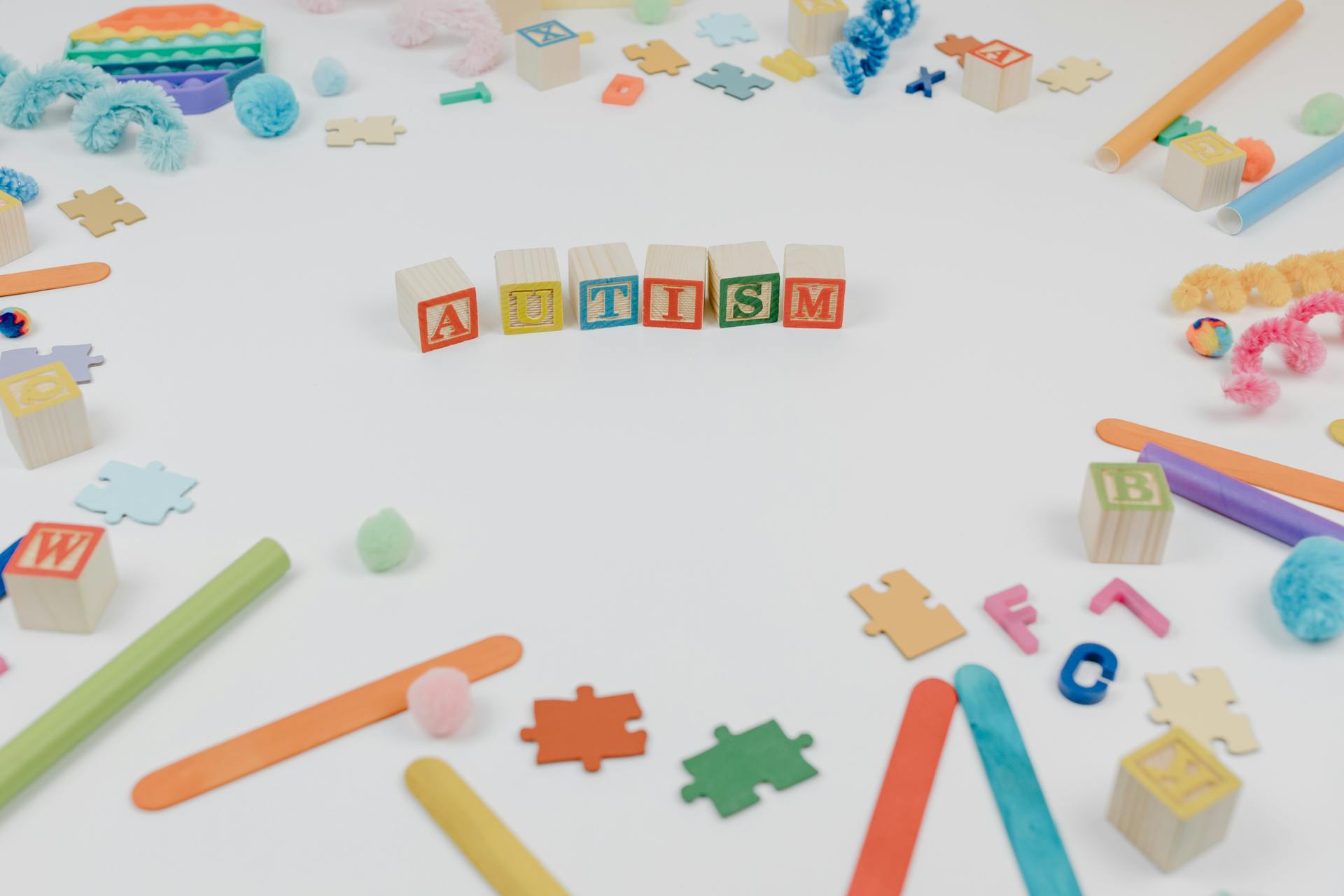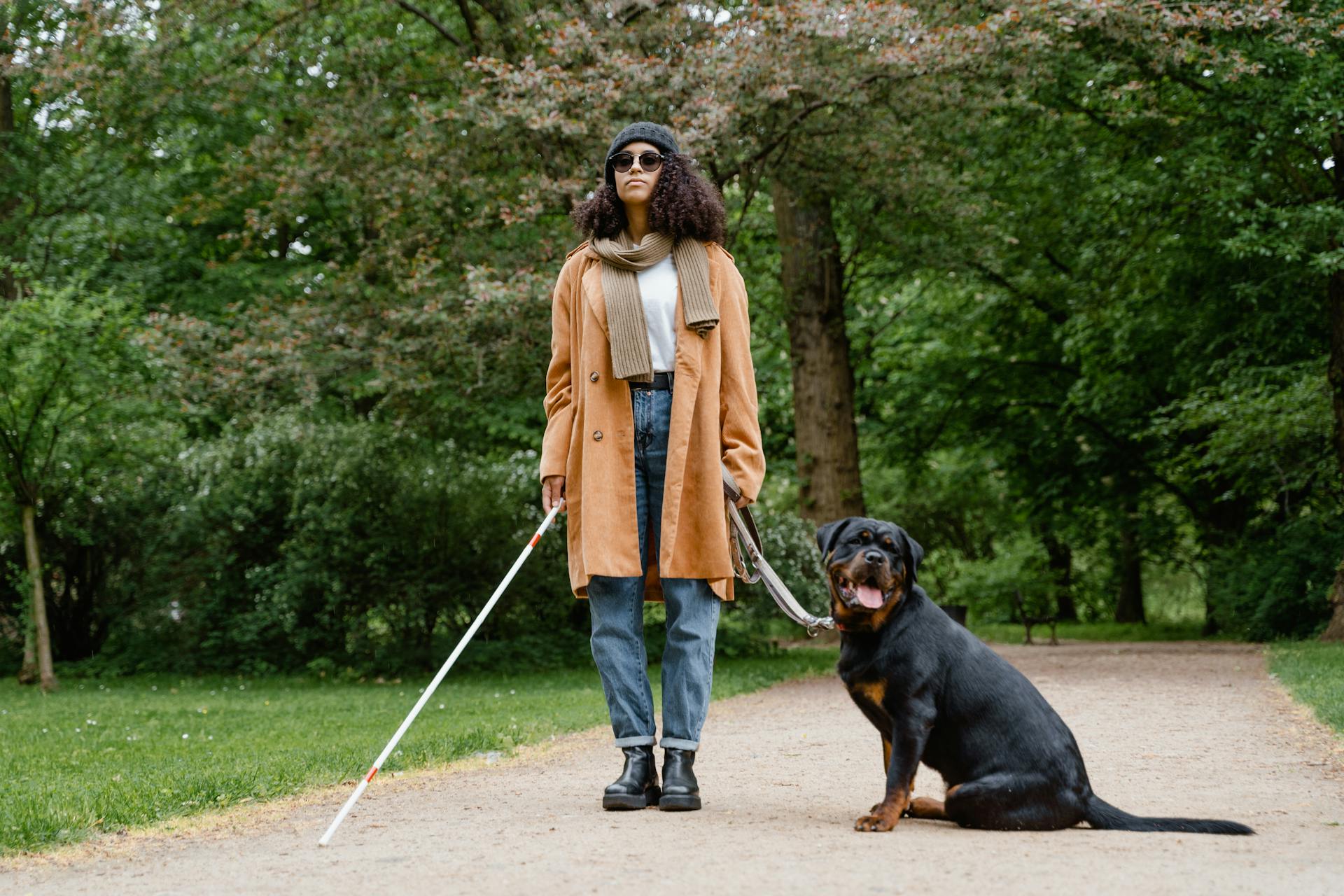
Service dogs can be a game-changer for autistic adults, providing a sense of security and independence.
Autistic adults may be eligible for a service dog if they have a diagnosed disability that significantly impacts their daily life, such as anxiety, sensory processing disorder, or difficulty with social interactions.
Service dogs can be trained to perform a variety of tasks, including interrupting meltdowns, providing physical support, and assisting with daily routines.
Eligibility for a service dog is typically determined by a healthcare professional, such as a psychologist or occupational therapist, who assesses the individual's needs and recommends a service dog.
Finding and Training a Service Dog
Finding a service dog that's a good fit for you or a loved one with autism requires some research and consideration. You'll want to look for breeds that are loyal, highly trainable, and remain calm in high-stress situations.
Some of the best breeds for autism service dogs include German Shepherds, Labrador Retrievers, Poodles, Golden Retrievers, and Corgis. These breeds are known for their intelligence, loyalty, and affectionate nature, making them well-suited to provide the support and comfort that autistic individuals need.
Training is also a crucial step in preparing a service dog for autism. Online programs like Pettable's can provide professional and convenient training that's adaptable to your needs and those of your dog.
Curious to learn more? Check out: Service Dogs for Autism
Finding the Right Animal

Finding the right animal for a service dog role is crucial. A dog trainer can help you find the perfect dog for your needs.
The temperament of the dog is more important than its breed. A service dog should be able to handle stressful situations in public, which requires a calm and focused temperament.
A dog can be any breed or mix, as long as it has the right temperament. Labradors and golden retrievers are among the most popular breeds for service dogs.
Matthew Evans bonded instantly with his service dog Clarence, who focused on Matthew rather than his siblings or parents. This is an important quality in a service dog, as they should devote their attention to their handler.
Unlike therapy animals, service dogs should not enjoy interacting with everyone they meet. They should be focused solely on their handler.
Training
Training a service dog for autism can be a lengthy process. Some organizations may spend a year or more raising and training dogs that meet their standards to become a service dog.

It's essential to find a reputable organization to work with, as some may charge a significant amount of money for the service. A nominal application fee may be required, but others may ask for $20,000 or more.
To ensure a successful partnership, it's crucial to research and find a trainer who has experience working with service dogs for autism. Diefenthaler encourages families to contact multiple organizations that serve their location to find the one best suited for their situation and needs.
Training should start as soon as possible, and professional training programs are available, such as Pettable's online program, which offers a 100% money-back guarantee.
A service dog's training should focus on tasks that are specific to the individual's needs, such as delivering medications in the event of a seizure or disrupting self-harming behavior.
Here are some key tasks that a service dog may be trained to perform:
- Delivering medications in the event of a seizure.
- Disrupting self-harming behavior.
- Providing tactile relief in a stressful situation.
- Warning people away if they sense that their owner is distressed.
Can Any Breed Be a Psychiatric Dog?

Any dog can be a psychiatric service dog, regardless of breed. However, not every breed is well-suited for the high level of training required.
A dog's temperament is crucial for a service dog. A service dog should focus on their handler, not everyone they meet. This is especially important for children with autism who need extra love and affection.
The right breed can make a big difference. German Shepherds, Labrador Retrievers, and Golden Retrievers are popular breeds for service dogs, including those for autism. These breeds are easily trainable and have the right temperament for the job.
Here are some breeds that are well-suited for psychiatric service dogs:
- German Shepherd: a large breed that's easily trainable and well-known for producing working dogs.
- Labrador Retriever: a trainable and adaptable breed with a naturally cheerful demeanor.
- Cocker Spaniel: a loyal and loving breed that's easy to train and provides comfort.
- Poodle: a highly intelligent breed with a hypoallergenic coat that's ideal for individuals with allergies.
- Golden Retriever: a cheerful and loyal breed that's perfect for children with autism.
Tasks and Benefits
Service dogs for autistic adults can be trained to perform a variety of tasks to help them navigate their daily lives.
A service dog can be trained to recognize anxiety triggers and divert their owner from an overwhelming environment, alleviating anxiety and stress. This can be especially helpful for individuals with autism who experience high levels of anxiety.
Expand your knowledge: How Much Do Psychiatric Service Dogs Cost

Some service dogs can be trained to provide deep pressure, which can be soothing during meltdowns. This is achieved by laying across the person's lap, creating a calming effect.
Service dogs can also serve as a social bridge between the person and their peers, helping to improve social interactions and teach individuals to read emotions in others.
What Is a Psychiatric Animal?
A psychiatric animal, specifically a psychiatric service dog, is a specially trained animal that helps people manage mental illnesses, developmental disorders, and learning disabilities.
These animals are trained to perform tasks that are difficult for the owner to do themselves, such as managing symptoms of autism spectrum disorder or schizophrenia.
The training process for a psychiatric service dog is extensive and requires certification, which is protected under law by the Americans with Disabilities Act (ADA), the US Department of Housing and Urban Development (HUD), and the Department of Transportation (DOT).
This protection allows people to take their psychiatric service dog anywhere, regardless of usual animal restrictions.
Unlike emotional support animals, which can be any animal or breed and require no training, psychiatric service dogs are highly trained to assist their owners.
A fresh viewpoint: Can a Mini Horse Be a Service Animal
Tasks Could Perform

Tasks a service dog can perform for an autistic person include helping with wandering and deep pressure, recognizing and responding to anxiety triggers, and providing tactile distraction and emotional support.
A service dog can be trained to prevent wandering by being tethered to the person with autism, or by having two leashes, one for the child and one for the handler.
They can also be trained to interrupt repetitive and undesired behaviors, such as stimming, by physically touching the person.
In addition, a service dog can be trained to calm meltdowns by laying across the person's lap, creating deep pressure, or by providing gentle strokes.
These dogs can also serve as social bridges, helping individuals with autism interact with their peers by presenting a common topic to talk about.
The training process for a service dog can take two to three years, and the cost can range from $18,000 to more than that, depending on the agency and location.
Some families use online or in-person fundraisers to raise money for their service dog.
Expand your knowledge: Autism Dog Training near Me
What Animals Do for Adults

Service dogs for autistic adults can be trained to perform a variety of tasks to help their owners navigate daily life.
A service dog's handler is the person with a disability or medical condition, or their parent, in the case of a young child. This means that the service dog's focus should be on the handler, rather than interacting with everyone they meet.
Service dogs can be any breed or mix, but some popular breeds for autism service dogs include German Shepherds, Labrador Retrievers, Poodles, Golden Retrievers, and Corgis.
Tasks that service dogs can perform for adults with autism include delivering medications in the event of a seizure, disrupting self-harming behavior, providing tactile relief in a stressful situation, and warning people away if they sense that their owner is distressed.
Some service dogs can even be trained to recognize and respond to specific behaviors or triggers that may cause distress for their owner.
Here are some specific tasks that service dogs can perform for adults with autism:
- Delivering medications in the event of a seizure.
- Disrupting self-harming behavior.
- Providing tactile relief in a stressful situation.
- Warning people away if they sense that their owner is distressed.
Eligibility and Professionals
To qualify for an autism service dog, you'll need to be diagnosed by a medical or mental health professional. This is the first step in getting the support you need.
Adults with high-functioning autism may experience "invisible" symptoms like depression, which a service dog can help alleviate. The comforting effects of a service dog can provide stability for individuals with high-functioning autism and depression.
A psychiatric service dog can be trained to recognize seizure warning signs in individuals with autism who experience epilepsy. This can help ensure their safety during an epileptic attack.
Check this out: Service Dogs for Depression
Benefits Eligibility
Anyone living with Autism Spectrum Disorder (ASD) can qualify for an autism service dog, regardless of age.
To qualify, an individual must be diagnosed by a medical or mental health professional.
Adults with high-functioning autism may still experience "invisible" symptoms like depression, which a service dog can help manage by providing stability and support.
An autistic child who exhibits severe symptoms may benefit from a service dog's stabilizing presence, especially if they struggle with environmental triggers like loud noises or bright lights.
For your interest: Dog Training for Autism Therapy Dogs
Epilepsy is a common autism symptom that may come on suddenly, putting an autistic person at risk if they experience a seizure outside their home.
A psychiatric service dog can support an autistic person with epilepsy by recognizing seizure warning signs and alerting another person to receive help.
If an autistic person has medication to help with seizures, a service dog can bring it to them to help manage the episode.
Explore further: Seizure Response Dog
Can Someone Have a Service Dog?
Many people with autism can benefit from the highly-specialized support a service dog provides. They must be patient and unaggressive with the animal.
To qualify for a service dog, the person must be able to care for the dog and provide it with the necessary training.
Finding a Psychiatric Professional
You can take an easy assessment to get started on the process of getting a psychiatric service dog for autism. Pettable's assessment is a great place to begin.
To work with a mental health professional, you'll need to consult with one of Pettable's experts. They'll help guide you through the process.
Pettable offers online PSD training programs, which can be a convenient option for those who need flexibility.
Explore further: Service Dogs Registration
Frequently Asked Questions
What is the best dog for a service dog with autism?
For individuals with autism, breeds like Golden Retrievers, Labrador Retrievers, and Poodles are often recommended due to their calm and gentle nature, making them well-suited as service dogs. These breeds can provide emotional support and comfort, helping to create a more stable and secure environment.
Sources
- https://sparkforautism.org/discover_article/service-dogs-autism/
- https://www.elorafergustoday.com/pets-animals/demand-soars-for-adults-in-need-of-autism-service-dogs-8524118
- https://pathfindersforautism.org/articles/treatments-therapies/pfa-tips-therapy-and-service-dogs/
- https://pettable.com/blog/service-animal-for-autism
- https://autismsouthcentral.org/resource-directory/wpbdp_category/service-support-animals/
Featured Images: pexels.com


